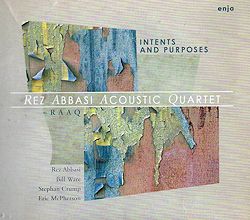1. Black Market
2. Butterfly
3. Joyous Lake
4. Medieval Overture
5. Resolution
6. Red Baron
7. Low-Lee-Tah
8. There Comes a Time
Rez Abbasi - Steel string, fretless and baritone acoustic guitars
Bill Ware – Vibes
Stephan Crump – Acoustic bass
Eric McPherson - Drums
Rez Abbasi was born in Pakistan and raised in California. His latest album is a bit of a surprise, containing entirely acoustic music. He tackles various
tunes from the jazz-rock era of the 1970s but discards their electric apparatus in favour of a gentle, acoustic approach which makes them sound entirely
new. The line-up is also unusual: guitar, vibes, bass and drums, but this allows the group to play gently some tunes which were probably louder when they
were first released.
For instance, Joe Zawinul’s Black Market first appeared on Weather Report’s 1976 Black Market album, with forceful electric keyboards and
snarling bass. Rez Abbasi’s quartet presents it in an entirely different fashion. Everything is quietened down and subdued into a soothing experience. This
might be expected to imply a lack of backbone, but the quartet manages to keep enough hidden power beneath the notes.
Similarly, Butterfly from Herbie Hancock’s 1974 album Thrust had bass-heavy instrumentation and grinding keyboards. Rez Abbasi offers a
slimmed-down interpretation which is forceful enough but not overbearing. The vibraphone drifts intriguingly beneath the guitar. On several other tracks,
the vibes plays in unison with the guitar, making a surprisingly tasty combination. Bass and drums help the reflective mood, never accenting too fiercely
for the good of the music.
As with Larry Coryell’s original, Rez Abbasi’s Low-Lee-Tah has prominent guitars but Abbasi’s version stays in the same placid mode rather than
breaking out fiercely in the middle as Coryell’s does. Nonetheless Red Baron (from Billy Cobham’s album Spectrum) has quite a lot of
muscle, although it is nowhere near as assertive as the original.
In these days of powerhouse rock groups, it is a brave enterprise to issue an album which makes a virtue of tenderness but it succeeds splendidly, creating
its own distinctive sound world and calm atmosphere.
Tony Augarde
www.augardebooks.co.uk
